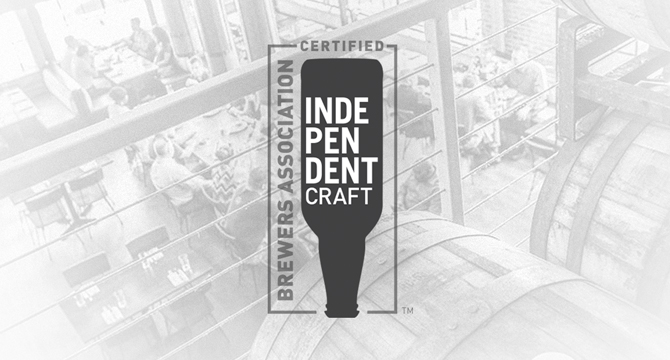
BA: More than 3,000 Brewers Adopt Independence Seal
Nearly eight months after introducing an official “independent craft brewer seal,” the Brewers Association (BA) announced that more than 3,000 brewers have signed up to use the mark.
The BA, a not-for-profit trade group representing the interests of small and independent U.S. craft breweries, introduced the seal last June and heavily promoted it during October’s Great American Beer Festival in Denver.
“Over time, as more beer lovers ‘seek the seal,’ it will have a powerful impact on purchasing decisions,” BA program director Julia Herz wrote on the organization’s website. “One of the main goals of the certified mark is to ensure that beer from small and independent U.S. craft brewers continues to be top of mind despite the flood of acquired beer brands now making their way into the market.”

Report: Gen Z Prefers Spirits Over Beer
A recently released report from Berenberg Research suggests that Generation Z, a new group of consumers that turned 21 at the start of 2018, “marks a turning point” as “the first generation to prefer spirits to beers,” according to Business Insider.
The report says Gen Z drinkers gravitate toward wine and spirits because they view them as quality products, while beer is seen as inauthentic and unappealing, the outlet reported.
Another issue for all alcoholic beverage companies: More Gen Z consumers say they’re drinking less alcohol than previous generations. According to Berenberg, the teens and twentysomethings surveyed — 6,000 U.S. residents — said they drank more than 20 percent less alcohol per capita than millennials. On top of that, 64 percent of the respondents said they anticipated consuming alcohol less frequently as they grow older.
That’s bad news for the beer industry, which has lost 35 million barrels in the last two decades.
For more insights on Generation Z consumers, watch a presentation by Kantar Futures vice president Lindsay Kunkle and Tropos Brand Consulting founder Mike Kallenberger from Brewbound’s December business conference.

MillerCoors to Move All Cider Production to Milwaukee Brewery
MillerCoors announced this week that it will move the entirety of its cider production to its 10th Street Brewery in Milwaukee, Wisconsin. As part of the transition, the company will cease production at its Colfax, California, facility and begin winding down contract production with City Brewing in Memphis, Tennessee.
“With its upgraded brewing and packaging flexibility, 10th Street is ideally suited to make high-quality ciders in bottles and cans,” Fernando Palacios, executive vice president and chief integrated supply chain officer, wrote in a memo to its wholesale partners and senior executives. “This includes Crispin Rosé, which is off to a strong start.”
MillerCoors, which was leasing the Colfax facility, said the shift will take effect in December 2018 due to the California production facility not having “the versatility or efficiency we need to take on all of our cider production.”
Reached by email, MillerCoors spokesman Marty Maloney told Brewbound that the company would also begin wrapping up contract production of its canned Crispin and Smith & Forge cider offerings at City Brewing in Memphis, although the exact timing of the transition is not yet known.
Maloney added that MIllerCoors will also transfer its non-alcohol soda production from California to Milwaukee and Fort Worth, Texas.
Palacios wrote that MillerCoors, the second largest brewer in the U.S., is developing transition plans for affected wholesalers “to ensure a smooth conversion and a high level of service throughout the process.” He added that the company will work with its 33 employees affected by the closure. However, Maloney told Brewbound that the move will create “incremental jobs” in Milwaukee.

Fuller’s Acquires Dark Star Brewing
London-headquartered Fuller’s Brewery has acquired West Sussex-based craft brewery, Dark Star Brewing, according to the Morning Advertiser.
Terms of the deal were not disclosed, however, Dark Star managing director James Cuthbertson will continue overseeing the smaller brewery’s business.
“The deal means we will continue to do what we do, but gives us huge opportunities to brew more one-off small batch beer hand-in-hand with exploring the export market and expanded bottle and can formats,” he told the outlet.
Fuller’s managing director Simon Dodd added that the company will initially provide Dark Star support for capital expenditure projects and back office support in addition to go-to-market infrastructure and access to its pub chain.

Albertsons to Merge with Rite Aid
The Albertsons grocery chain announced Tuesday that it will buy a portion of Rite Aid, the third-largest pharmacy chain in the U.S. According to a press release, the combined company will operate about 4,900 locations across 38 states and Washington, D.C., with more than 40 million weekly customers.
The combined entity is expected to generate $83 billion in revenue this year, according to the release. Albertsons, which includes Safeway and Star Market, is backed by private equity firm Cerberus Capital Management, L.P.
Rite Aid chairman and CEO John Standley will become CEO of the combined entity while Albertsons current chairman and CEO Bob Miller will serve as chairman. The company will have headquarters in Boise, Idaho, and Camp Hill, Pennsylvania.

New York Brewery Count Hits 400
New York Gov. Andrew Cuomo announce that the state is now home to a record-setting 400 breweries, eclipsing the previous mark set in 1876.
In a press release, the governor’s office noted that 243 new breweries have obtained licenses since Cuomo hosted the state’s first Wine, Beer and Spirits Summit in 2012. Beer is now being produced in 57 of the state’s 62 counties, the release noted.
According to the release, 202 new farm brewery licenses have been issued since a farm brewery law was enacted in 2013, which allows craft breweries that use New York-grown ingredients to conduct onsite tastings, open restaurants, self-distribute their products and open up to five no-fee off-site stores.